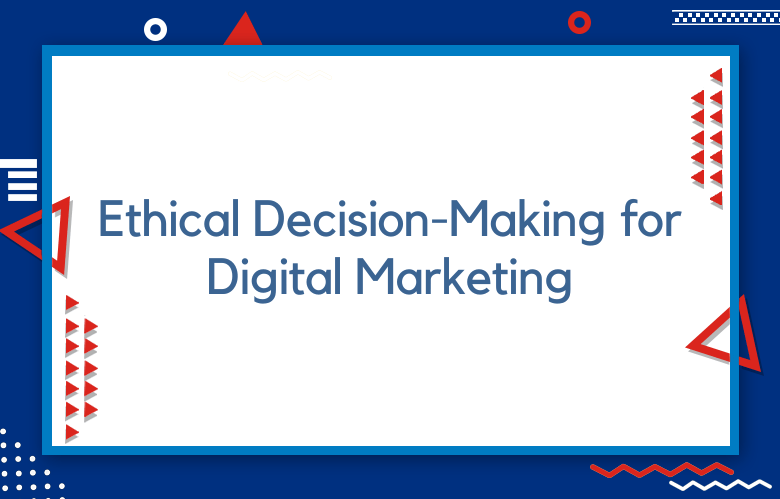Ethical Decision-Making for Digital Marketing: Building Trust & Transparency

Ethical decision-making in digital marketing is essential in navigating the complexities of consumer interactions and data management in the digital age. Marketers face increasing ethical challenges as digital marketing strategies become more sophisticated and incorporate advanced technologies and data analytics. These challenges include ensuring data privacy, avoiding deceptive practices, maintaining transparency in advertising and content creation, and respecting cultural and social sensitivities.
Ethical Decision-Making for Digital Marketing: Building Trust & Transparency
The foundation of ethical decision-making in digital marketing lies in recognizing the impact that marketing practices can have on consumer trust, brand reputation, and the broader societal context. Ethical considerations extend beyond legal compliance, requiring marketers to adopt principles that promote honesty, fairness, respect, and responsibility in their digital engagements.
Implementing ethical practices involves a commitment to transparent data collection and usage policies, clear disclosure of sponsored and paid content, respect for consumer preferences and consent, and creating content that is engaging, truthful, and respectful of diversity. As digital platforms evolve, staying informed about emerging ethical dilemmas and fostering an organizational culture prioritizing ethical decision-making is crucial for sustainable success in digital marketing.
- Key Takeaways
- Understanding Digital Marketing Ethics
- Pillars of Ethical Marketing
- Emphasizing Transparency
- Advancing Cause-Related Marketing
- Integrating Sustainability Strategies
- Navigating Ethical Challenges Today
- Promoting Diversity and Inclusion
- Partnering with Ethical Businesses
- Building Consumer Trust Through Ethics
- Summary
- Frequently Asked Questions
- What are the fundamental principles of ethical decision-making in digital marketing?
- How can businesses promote diversity and inclusion in their digital marketing strategies?
- Why is building consumer trust through ethics essential for digital marketing success?
- How can digital marketers navigate ethical challenges effectively in today’s dynamic landscape?
- What role does sustainability play in shaping ethical marketing practices?
Navigating the realm of digital marketing demands a compass of ethical decision-making. In a landscape where algorithms shape visibility, and consumer trust is paramount, the choices made by marketing professionals can either build lasting relationships or erode credibility. Understanding the nuanced interplay between strategy and ethics is crucial for success in today’s online market. This blog post delves into the significance of ethical decision-making in digital marketing, exploring its impact on brand reputation, customer loyalty, and long-term growth strategies.
Key Takeaways
Prioritize Transparency
Ensure your digital marketing strategies are transparent to build trust with your audience.
Incorporate Cause-Related Marketing
Integrate social responsibility into your campaigns to resonate with socially conscious consumers.
Embrace Sustainability
Implement sustainable practices in your marketing efforts to appeal to environmentally conscious customers.
Address Ethical Challenges
Stay informed and proactive in navigating ethical dilemmas in digital marketing.
Foster Diversity and Inclusion
Promote diversity and inclusivity in your campaigns to connect with a broader range of audiences.
Collaborate with Ethical Partners
Partner with businesses that share your ethical values to strengthen your brand’s credibility and reputation.
Understanding Digital Marketing Ethics
Definition
Ethics in digital marketing refers to the moral principles and values guiding online business behavior. It involves marketing professionals making honest, transparent, and respectful decisions towards consumers.
Ethical practices in digital marketing are crucial for maintaining trust with customers and stakeholders. By prioritizing integrity and transparency, companies can build a positive reputation and establish long-term relationships with their audience.
Impact on Brand Reputation
Unethical digital marketing practices such as spamming, misleading advertisements, or data privacy violations can damage a brand’s reputation. Consumers today value authenticity and ethical behavior more than ever before.
Conversely, companies that prioritize ethical practices not only enhance their brand image but also create a loyal customer base. Building trust through ethical digital marketing strategies can increase customer retention and positive word-of-mouth referrals.
Moral Principles
Companies engaging in digital marketing should adhere to fundamental moral principles such as honesty, fairness, and respect for privacy. Honesty involves providing accurate information about products or services without misleading consumers.
Fairness entails treating all customers equally and avoiding discriminatory practices. Respecting privacy means safeguarding customer data and using it responsibly to personalize marketing efforts without infringing on individuals’ rights.
Pillars of Ethical Marketing
Transparency
Transparency is a foundational pillar of ethical marketing practices. Marketing professionals must prioritize openness and honesty in their campaigns to build consumer trust. Companies can establish credibility and authenticity by providing clear information about products, services, and business practices.
Maintaining transparency involves disclosing potential conflicts of interest, ensuring that advertisements are truthful and accurate, and being upfront about data collection and privacy policies. This transparency enhances consumer trust and helps cultivate long-term relationships with customers.
Cause-Related Marketing
Cause-related marketing plays a vital role in ethical marketing strategies by demonstrating a company’s commitment to social responsibility. When brands align with charitable causes or environmental initiatives, they showcase their values beyond profit-making motives. This alignment resonates with consumers who increasingly seek to support businesses that contribute positively to society.
By engaging in cause-related marketing, companies differentiate themselves from competitors and create a positive brand image. Consumers are likelier to trust and remain loyal to brands that actively support causes they care about. This approach fosters a sense of community and shared values between the brand and its audience.
Emotional Connection
Ethical marketing practices can foster a deeper emotional connection between brands and consumers. By prioritizing honesty, integrity, and social responsibility in their messaging, companies can evoke meaningful emotions in their audience. When consumers perceive that a brand operates ethically, they feel aligned with its values.
Creating emotionally resonant marketing campaigns leads to increased brand loyalty and customer engagement. Consumers are more likely to support brands that share their beliefs and principles. This emotional connection goes beyond transactional relationships, transforming customers into brand advocates who promote the company to others.
Emphasizing Transparency
Trust Building
Transparency in digital marketing is crucial for fostering trust with consumers. By openly sharing information about products and services, brands can establish credibility and value their customers’ trust.
Maintaining transparency in all marketing efforts helps avoid potential data breaches and unethical practices. Brands that prioritize honesty are more likely to retain customers and avoid damaging their reputations.
Brand Reputation
An essential aspect of ethical decision-making in digital marketing is emphasizing integrity and authenticity. When brands uphold these fundamental values, they attract customers and enhance their brand reputation.
Advancing Cause-Related Marketing
Deepening Connections
Authentic involvement in cause-related marketing initiatives allows brands to deepen connections with their target audience. By aligning with a meaningful cause, companies showcase their purpose beyond profit, resonating with consumers personally.
This genuine engagement creates a sense of community and shared values between the brand and its customers. As a result, the audience feels more emotionally connected to the brand, leading to increased loyalty and advocacy.
Influencing Consumer Behavior
Associating with brands that prioritize ethical practices and have clear values significantly impacts consumer behavior. When consumers perceive a brand as socially responsible, they are more likely to support it through their purchasing decisions.
Research shows that action speaks louder than words in marketing. Brands actively involved in cause-related initiatives attract new customers and retain existing ones by fostering trust and credibility.
- Brands engaging in cause-related marketing witness an increase in customer loyalty.
- Consumers are more inclined to choose products from socially responsible companies.
Creating Positive Impact
Cause-related marketing can create a positive impact on society while resonating with consumers. When brands stand on important issues or support charitable causes, they demonstrate their commitment to making a difference beyond profits.
By showcasing their dedication to social responsibility, brands can differentiate themselves in a competitive market landscape. This differentiation attracts socially conscious consumers and enhances brand reputation and goodwill.
- Companies that engage in cause-related marketing contribute positively to society.
- Aligning with impactful causes helps brands build a strong emotional connection with consumers.
Integrating Sustainability Strategies
Sustainable Measures
Sustainable measures in digital marketing involve incorporating eco-friendly practices to reduce environmental impact. For example, companies can minimize their carbon footprint by utilizing renewable energy sources.
Implementing sustainable measures can lead to long-term cost savings. It also enhances brand reputation by showcasing a commitment to environmental responsibility.
Technology Integration
Technology plays a crucial role in enabling sustainability strategies within digital marketing. Data analytics helps track and optimize energy consumption, effectively reducing waste.
By leveraging automation tools, companies can streamline processes, increasing efficiency and reducing resource consumption. This integration fosters a culture of sustainability within the organization.
Importance of Promoting Sustainable Products
Promoting sustainable products and services is essential for attracting environmentally conscious consumers. It showcases a company’s dedication to social responsibility and ethical business practices.
Consumers are increasingly demanding transparency regarding the sustainability of the products they purchase. By offering sustainable options, businesses can cater to this growing market segment.
Navigating Ethical Challenges Today
Data Privacy
Ensuring ethical considerations in digital marketing involves effectively addressing data privacy concerns. Marketers must prioritize safeguarding consumer information to build trust.
Data breaches can have severe consequences, damaging a company’s reputation and leading to legal repercussions. By implementing robust security measures, businesses can protect sensitive data from unauthorized access.
Diversity and Inclusivity
Promoting diversity and inclusivity in marketing campaigns is crucial for ethical decision-making. Companies should strive to represent diverse voices and perspectives in their advertisements.
Promoting Diversity and Inclusion
Authentic Representation
Promoting diversity in digital marketing is crucial to respecting all people and groups and ensuring they feel represented and valued. By showcasing authentic representation in marketing campaigns, brands can establish a strong connection with their diverse audience. This approach fosters inclusivity and enhances brand reputation by demonstrating a commitment to embracing diversity.
Embracing diversity goes beyond tokenism; it involves genuinely reflecting different communities’ varied perspectives and experiences. When brands prioritize authentic representation, they signal consumers that they value diversity and are willing to engage with various cultural backgrounds. This approach helps build trust and loyalty among consumers who appreciate seeing themselves accurately portrayed in marketing materials.
Strategic Approach
Addressing diversity and inclusion issues in marketing strategies is essential for brands to stay relevant in today’s diverse marketplace. By incorporating inclusive practices into their campaigns, companies can attract a broader audience base and create a more inclusive brand image. Moreover, considering diverse perspectives when developing marketing content can lead to more innovative ideas and unique storytelling approaches that resonate with diverse audiences.
By actively promoting diversity and inclusion, brands can tap into new markets, connect with underrepresented groups, and foster a sense of belonging among all consumers. Companies that prioritize these values contribute to a more inclusive society and position themselves as socially responsible entities that care about the well-being of their customers.
Pros
- Enhanced brand reputation
- Increased customer loyalty
- Access to new markets
Cons
- Potential backlash if authenticity is questioned
- Requires ongoing commitment and effort
Partnering with Ethical Businesses
Benefits
Partnering with ethical businesses can bring numerous benefits to your company. By collaborating with organizations that prioritize ethical practices, you can enhance your brand’s reputation and credibility. These partnerships can lead to increased trust from consumers who value ethical values.
Brand Credibility
Aligning with ethical businesses can significantly enhance brand credibility. When your company associates itself with other organizations known for their moral standards, it sends a powerful message to customers. This association can help build trust and loyalty among consumers increasingly conscious of the ethics behind the products and services they support.
Shared Ethical Values
It is crucial to align with businesses with similar ethical values to maintain consistency in your messaging and actions. Collaborating with companies that uphold your moral principles reinforces your commitment to integrity and responsibility. Such partnerships benefit your brand and contribute to a more sustainable and ethical business ecosystem.
Building Consumer Trust Through Ethics
Aligning Strategies
Ethical practices in digital marketing play a pivotal role in building consumer trust. When companies prioritize integrity and honesty in their marketing efforts, they establish a strong foundation of trust with their audience. By ensuring that all consumer data is handled ethically and transparently, businesses demonstrate their commitment to maintaining the trust of their customers.
Importance of Ethics
The integration of ethical practices is essential in modern digital marketing due to consumers’ increasing emphasis on transparency and authenticity. In today’s interconnected world, where information spreads rapidly through social media and online platforms, unethical conduct can tarnish a company’s reputation. Therefore, upholding ethical standards safeguards a brand’s image and fosters long-term relationships with customers based on trust and credibility.
Corporate Responsibility
Corporate responsibility goes hand in hand with ethical decision-making in meeting consumer demands. Consumers are becoming more discerning about the brands they support, expecting them to deliver quality products or services and operate with a sense of social and environmental responsibility. By incorporating ethical considerations into their marketing strategies, companies can address these expectations and showcase their dedication to making a positive impact beyond profits.
Summary
You’ve delved into ethical decision-making in digital marketing, understanding its pillars, like transparency and cause-related marketing. Embracing sustainability and promoting diversity are vital aspects of today’s landscape. Navigating challenges and partnering with ethical businesses can set you apart, building trust with consumers through ethical practices.
Incorporating these principles enhances your brand reputation and fosters long-term relationships with your audience. By prioritizing ethics in your digital marketing strategies, you contribute to a more sustainable and inclusive industry and establish yourself as a trustworthy and responsible entity in the eyes of your customers. Take these insights and empower your digital marketing efforts with ethical considerations at the forefront.
Frequently Asked Questions
What are the fundamental principles of ethical decision-making in digital marketing?
Ethical decision-making in digital marketing is based on transparency, honesty, fairness, respect for privacy, and compliance with laws and regulations. These principles guide marketers in responsible practices that benefit consumers and society.
How can businesses promote diversity and inclusion in their digital marketing strategies?
Businesses can promote diversity and inclusion by representing diverse voices in their content, ensuring equal opportunities for all groups, fostering a culture of inclusivity within the organization, and collaborating with diverse influencers or partners to reach a broader audience authentically.
Why is building consumer trust through ethics essential for digital marketing success?
Building consumer trust through ethics is crucial as it enhances brand reputation, fosters long-term customer relationships, increases customer loyalty and retention, boosts credibility in the market, attracts new customers through positive word-of-mouth, and ultimately leads to sustainable business growth.
How can marketing professionals navigate ethical challenges effectively in today’s dynamic landscape?
Digital marketers can navigate ethical challenges by staying informed about industry standards and regulations, conducting regular ethics training for employees, seeking feedback from stakeholders on ethical practices, being transparent about their processes and decisions, and adapting quickly to changing ethical concerns in the digital space.
What role do corporations and professionals play in shaping ethical marketing practices?
Sustainability plays a significant role in shaping ethical marketing practices by encouraging environmentally friendly initiatives, responsible sourcing of materials, reducing carbon footprint, supporting social causes aligned with sustainability goals, and demonstrating corporate social responsibility to consumers who prioritize eco-conscious brands.



